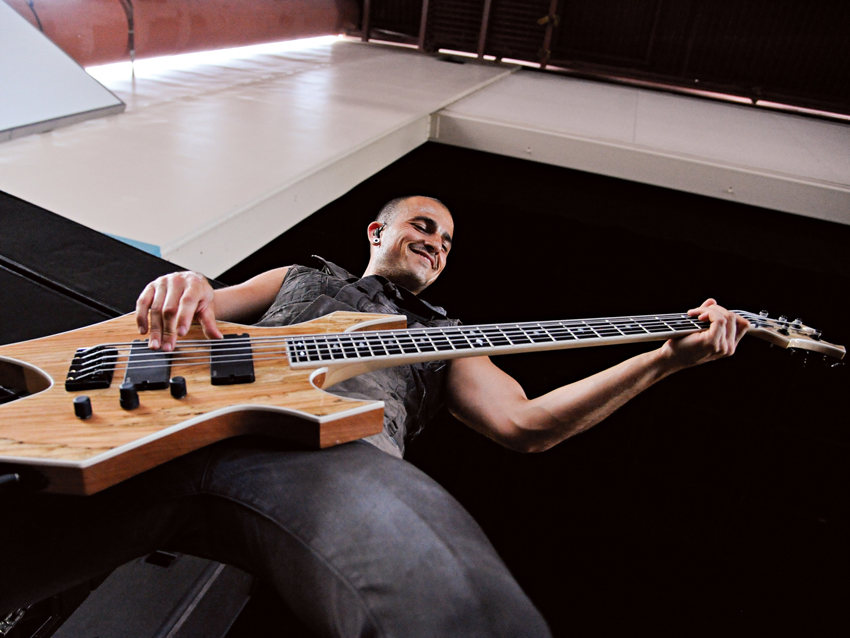Trivium's Paolo Gregoletto talks Vengeance Falls
Bass player gives us the word on album six

Trivium's Paolo Gregoletto talks Vengeance Falls
When Avenged Sevenfold smashed their way to the top of the charts worldwide with their latest album, they did so by adding hefty dollops of classic rock to their early hard-edged sound.
Many expected Trivium, now on their sixth studio album, to follow suit. But the Floridan foursome aren’t playing ball. Vengeance Falls is a brutal dose of 21st century thrash metal, a stunning example of how a band’s sound can naturally evolve.
We spoke to bass player Paolo Gregoletto about tracking the record, working with producer David Draiman and how Trivium have hit top gear while staying true to their their raw as hell roots…

Writing and David Draiman
“We started writing around when [2011 album] In Waves came out. We were on tour and always had guitars lying around. So we would write riffs and we started demo-ing.
"We were writing and working together for just over a year before we started working with [producer/Disturbed frontman] David [Draiman], so we had a good headstart.
“We first talked about working with David on the Mayhem tour we were on with Disturbed. We gave David a copy of In Waves. A few days later he came back and was blown away by the record. He said he was going to have some time in 2013 and would love to work with us.
"We met up with him a couple of times on tour, and every time we met up with him it just seemed like the right idea. What he said he could do with Trivium on our next record just made sense.”

Pre-production and vibe
“One big thing David had us do was to come into pre-production and not be overly rehearsed. That has always been our thing: rehearsal is huge.
"He said we could know the parts but we should be open to them being able to change. When we did pre-production I think we had 14 songs, and he really dove into every aspect of the song.
"Usually in pre-production we would work a lot on the music, and the vocals would be kind of written or worked on in the studio. This time, vocals were worked on from day one. Matt [Heafy] and David would work out the melodies and cadences so that when we got to recording we knew how the vocals were going to sound.”
“I wanted it to have the vibe like when you’re playing live, and you’re in the moment and just vibing off the show and the crowd. In the studio it was very relaxed and we weren’t focused on rehearse, rehearse, rehearse.
"It was all about the music and the excitement of seeing a song come together. It was nice to come up with basslines on the spot and try them.”

Honing the tracks
“We set up in this area at David’s house with an electronic drum kit and small PA. David was there, our engineer was there and we just played through the songs.
"I’d say at this point 80% of the riffs and ideas were done. In pre-production David really focused in on Nick [Augusto, drums] and the vocals. But then on things like Brave This Storm and To Believe, on the original versions it was the same riff through the verse, but David suggested that it should change every time around.
"That was something we’d never done - where a riff is expanded upon, and there is so much detail to a verse part. He tried to push us where it felt like we were just repeating and repeating. He got us out of our comfort zones.
"He told us we were great musicians and we didn’t need to settle on something and just repeat it and repeat it because it is easy; we should put layers into the song, not just double things for the sake of it. You need dynamics. He did that with the vocals, too. It’s something we had never done before.”

Drums 'n' bass
“I played with Nick back in the day. Obviously it's different now. He has improved playing live - he is such a solid drummer.
"He does some really intricate stuff with his kicks, so it’s really nice to be able to lock in and follow that. I think in general it has changed us and we’re more into being a tight unit and locking up because Nick is really on top of that.”

Profiling and keeping it raw
“When we did the mix we went over to the UK for two weeks with Colin Richardson and Carl Bown. When they re-amped stuff they were using Kemper [Profiling Amps]. I had never seen one before.
"Carl was like, ‘OK, we’re going to re-amp this song'. I was looking around for the cab and head! He explained how the Kemper works - it’s crazy stuff. When he got those tones I thought it was insane. That’s how we got turned onto those [amps] and now we’re using them live.”
“That was a big thing that sold me on working with David. He sat us down and said that he knew we’d been building this for years and we couldn’t sacrifice what we are and what our roots are. He wanted to build upon that and take it to the next level. That made me comfortable working with David. He didn’t want to make something that wasn’t us.
“Melody has always been a big part of this band and we really wanted to push that. We wanted it to be powerful and have the aggression to back it up when it needed the next level. I was so happy to be able to keep that as a fan of melodic and extreme metal.”
Rich is a teacher, one time Rhythm staff writer and experienced freelance journalist who has interviewed countless revered musicians, engineers, producers and stars for the our world-leading music making portfolio, including such titles as Rhythm, Total Guitar, Guitarist, Guitar World, and MusicRadar. His victims include such luminaries as Ice T, Mark Guilani and Jamie Oliver (the drumming one).
